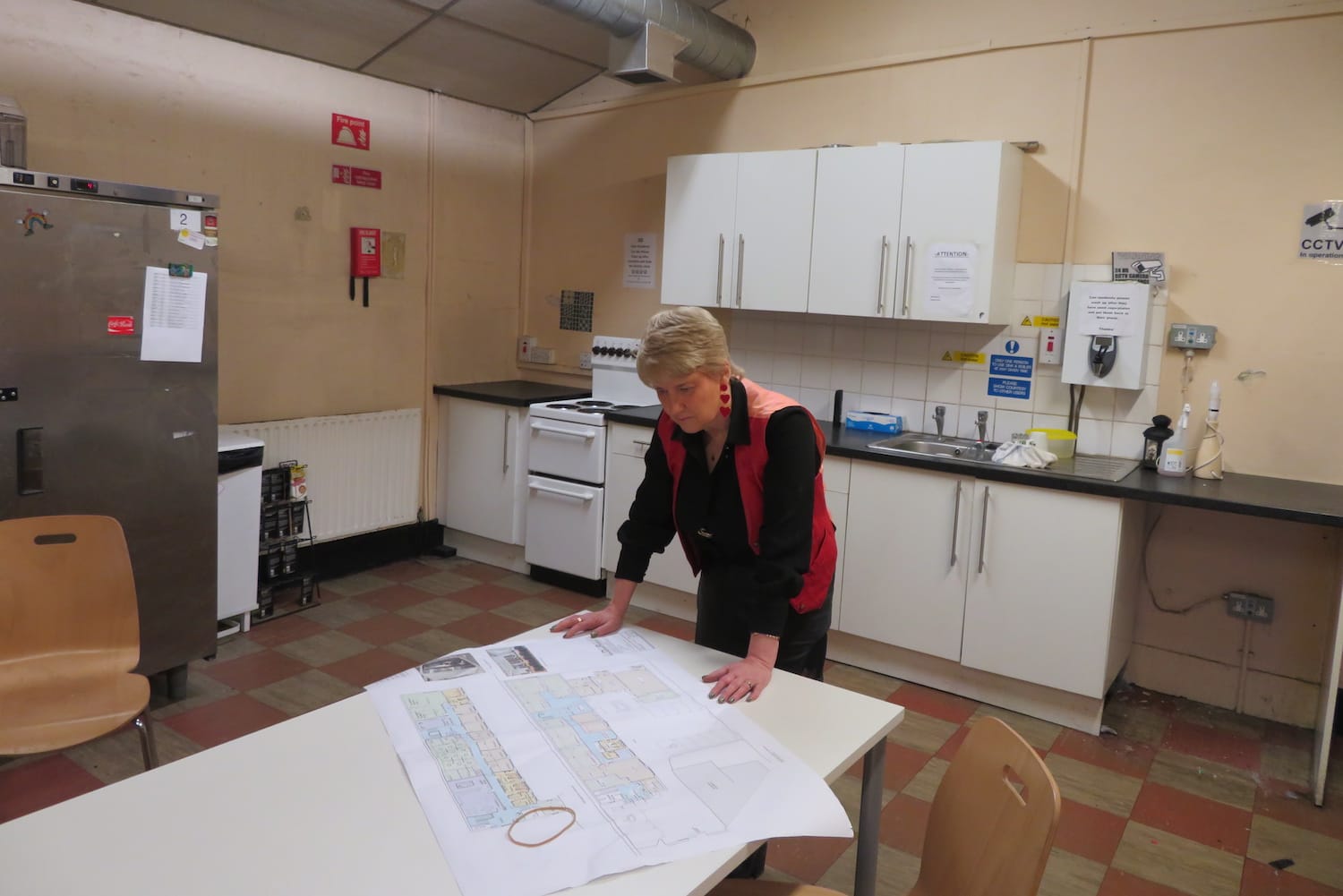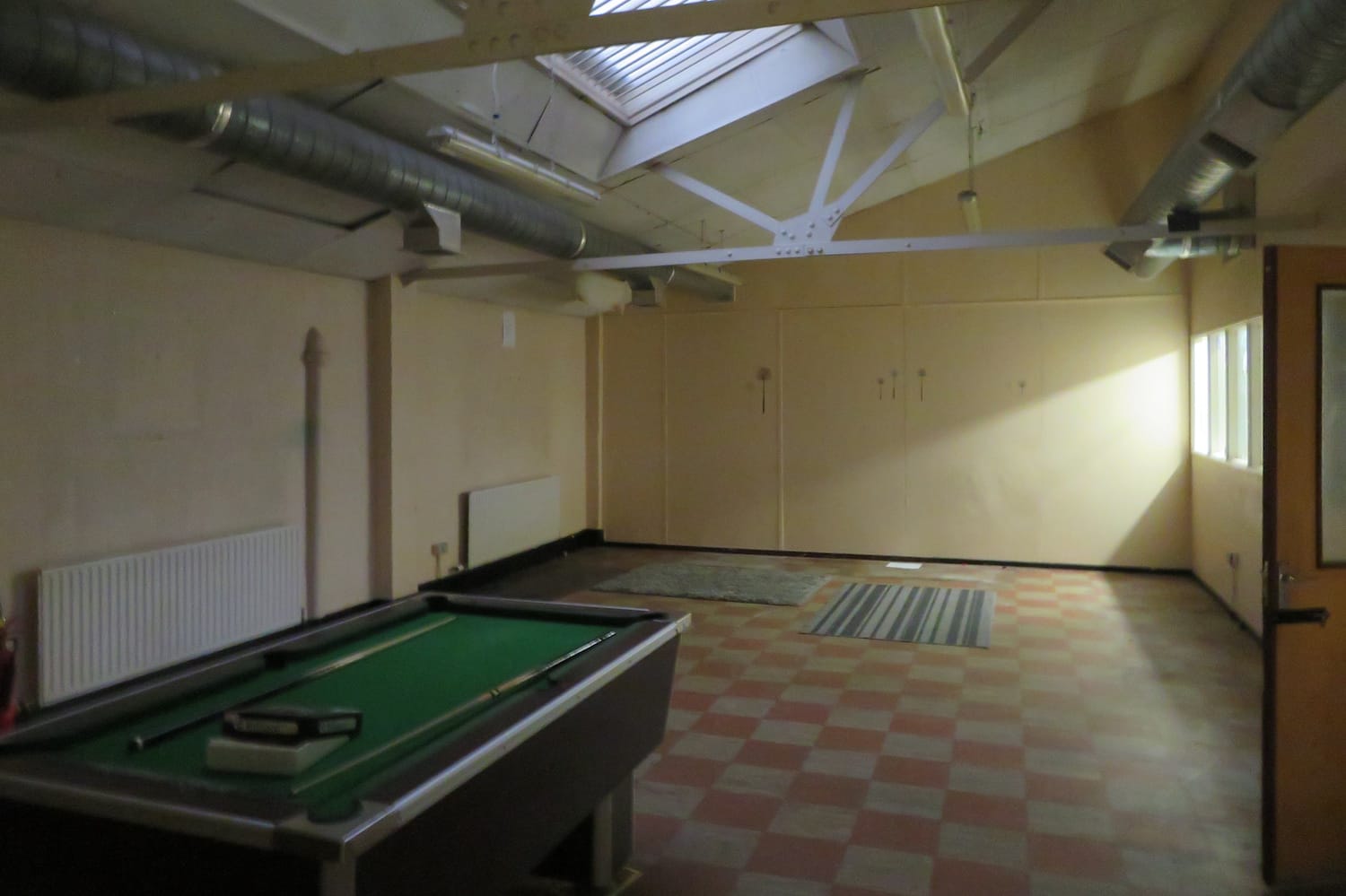What’s the best way to tell area residents about plans for a new asylum shelter nearby?
The government should tell communities directly about plans for new asylum shelters, some activists and politicians say.
There’s a plan to transform a large old council depot into an enterprise centre with mentoring and training for unemployed people and social entrepreneurs.

Evanne Kilmurray strides through the old council housing-maintenance depot just south of King’s Inns in the north inner-city.
The 1,270 sqm building off Coleraine Street is slightly industrial-looking. The floor tiles are stained and worn and the paint on the walls is peeling.
Kilmurray, CEO of Inner City Enterprise (ICE), says she intends to transform this building into offices, shared workspaces, craft rooms, and a training room to provide space for small start-ups and social enterprises.
She walks into a large room with a pool table in it. “We might even keep this as a games room,” she says.
Once the renovation is completed a few bean bags, a coffee dock together with that pool table. “Maybe a dartboard too,” she says. “Or is that too dangerous?”
Kilmurray, who was also the founder of ICE, is not afraid to take a risk.
She has secured the lease on the building from Dublin City Council, after a vote by councillors at their monthly meeting on 6 December.
But Kilmurray doesn’t yet know where they will get approximately €350,000 she needs to renovate it. “The universe will provide,” she says.
In 1992, Kilmuarry set up ICE to help unemployed people from the inner-city launch businesses or go out on their own as sole traders.
ICE closed in 2006 when employment was at an all-time high. In 2012, she relaunched it and since then it has expanded its services.
Nowadays, “ICE helps unemployed individuals, young entrepreneurs and social entrepreneurs to get their businesses off the ground,” says Kilmurray.
It runs training sessions, she says, supporting people to set up all kinds of successful businesses dealing in jewellery, clothing, fitness and well-being, says Kilmurray.
Business owners might need mentoring support to draw up their business plan or support to apply for grants or loans, or training in book-keeping, she says.
Recently ICE has been offering training to people living in direct provision, the accommodation system for those seeking asylum in Ireland, and to patients of St Patrick’s Mental Health Services, she says.

ICE has helped 38 social enterprises get off the ground, says Kilmurray, through its own revolving loan fund or by assisting with applications to other funders, including Microfinance Ireland.
Those include Pocket Forests, an initiative to plant tiny native forests in disused spaces in the inner-city. “Try and create a tiny oasis of green to really bring the city alive,” says Kilmurray.
They also include PACE, an organisation that wanted to train young people with a history of offending to be baristas, she says. Together, they got The Mugshot mobile cafe up and running, which sells coffee outside the Four Courts, says Kilmurray.
The Robert Emmet Community Development Project, on Ushers Quay in the south inner city, runs two social enterprises that were helped by ICE, says Austin Campbell, its executive director.
In Our Shoes Walking Tours is a local tour guide company. “Graduates from the community telling positive stories about the community,” he says.
Bee8 trains people as bee-keepers, says Campbell, and has so far rolled out 22 beehives in 15 locations.
Next year, they plan to expand way beyond Dublin 8 and to have 120 hives, he says. “Which is literally millions of bees.”
Rents in Dublin are a massive issue for community groups, social enterprises and charities, says Campbell. “Social enterprises at the moment are competing with regular businesses for space, which isn’t feasible.”
“To have someone like ICE providing space at a discounted rate and also be connected to all the people you would have access to, would be hugely beneficial,” he says.
He hopes that he will get to put beehives on the roof of the new enterprise hub too, he says.
The site off Coleraine Street had been used as a base for council workers to provide housing maintenance, according to a report to councillors, by the council’s head of planning, Richard Shakespeare.
But those services were relocated. The council looked at whether it should put social housing on the site.
“However a decision was taken not to proceed with such proposals as only eleven units could be achieved on the site,” says the report. The site was ripe, though, for either commercial development or community use, the report says.
Behind a wall and metal gates, a large two storey building is attached in an L-shape to another smaller one-storey building.
There is a small car park at the front and a bigger one towards the back.
Inside some rooms are full of boxes, desks and chairs as well as other bits and pieces. There is also a walk-in safe.
The new hub will provide workspaces and offices at a discount to social enterprises and small start-ups who can’t yet afford commercial rents, says Kilmurray.
It will run as a social enterprise, she says. That means 60 percent of the space will be rented to a few anchor tenants, paying full market rates, she says, and the remaining 40 percent will be available at a discount.

There will be shared offices, co-working spaces and hot-desking, a training room and back-office services available, says Kilmurray.
“I’m hoping to see loads of social enterprises use it as a base,” she says. “As well as sole traders and entrepreneurs.”
Some of the people living in direct provision who took the training had good business ideas, she says. “I really want to encourage them as much as possible.”
She also wants artists and craftspeople to have access to a crafts room with some equipment, like a laser machine and potter’s wheel, she says.
“This is going to be a really welcoming atmosphere,” says Kilmurray. “The only risk is we will have so much fun, we won’t do any work.”
At the meeting of the full council on 6 December, councillors agreed to leasethe premises to ICE rent-free for the first year, and for €60,000 a year after that.
That rate is expected to gradually increase up to full-market rent, said a council report. The open market rent would be around €160,000 a year, it says.
In the meantime, the council isn’t funding the renovation. “I’m estimating I’ll have to raise around €350,000,” says Kilmurray.
She has private-sector sponsors, she says, and is hoping for government grants.
Kilmurray is used to fundraising. ICE is one-third government-funded but the rest is donated by companies and individuals, she says.
Each year she has to come up with around €200,000 to keep it going. How? “Beg, steal, borrow,” she says laughing. “Cajole.”